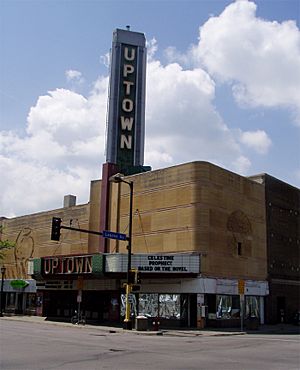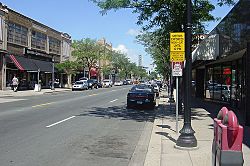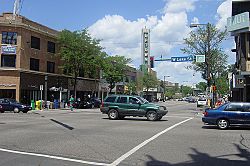Uptown, Minneapolis facts for kids
Quick facts for kids
Uptown Minneapolis
|
|
|---|---|
|
Commercial District
|
|
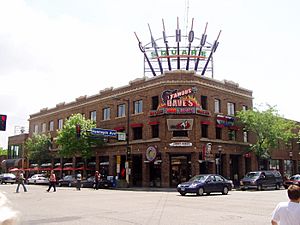
Seven Points, formerly known as Calhoun Square, has been at the center of Uptown since the 1980s.
|
|
| Motto(s):
"Normally out of the ordinary"
|
|
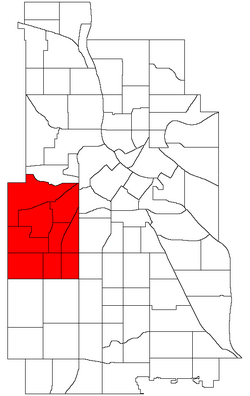
Uptown is within the Calhoun Isles community of the U.S. city of Minneapolis
|
|
| Country | United States |
| State | Minnesota |
| County | Hennepin |
| City | Minneapolis |
| Community | Calhoun Isles |
| Branded | 1920s |
| Founded by | Uptown businessmen created "Uptown" name for area |
| Named for | Desire to create an Uptown-like district similar to Chicago |
| Time zone | UTC-6 (CST) |
| • Summer (DST) | UTC-5 (CDT) |
| Area code(s) | 612 |
Uptown is a lively area in southwestern Minneapolis, Minnesota. It is a popular spot for shopping, fun nightlife, and cultural events. Uptown is located where Hennepin Avenue and West Lake Street meet.
This district covers parts of four neighborhoods: Lowry Hill East, East Bde Maka Ska, South Uptown, and East Isles. All these neighborhoods are part of the larger Calhoun Isles community.
Contents
Discovering Uptown's Past
How Uptown Got Its Name
In the 1880s, the areas around Bde Maka Ska (formerly Lake Calhoun), Lake Harriet, and Lake of the Isles became popular. People visited for vacations, staying in cottages and hotels. They also enjoyed boating, easily reaching the lakes by streetcar.
As Minneapolis grew south, many new homes were built, especially in the 1920s. A shopping area started to form just east of the lakes. At Hennepin Avenue and Lagoon Avenue, a large theater called the Lagoon Theatre was built. It hosted many different shows.
In 1939, the Lagoon Theatre burned down. When the owners decided to rebuild, local businesses saw a chance to give the area a new identity. They were inspired by the successful Uptown District in Chicago. The Minneapolis Tribune newspaper then announced the new Uptown District of Minneapolis. This new name centered around the rebuilt theater, which was renamed the Uptown Theatre.
Changes Over Time
Throughout the 20th century, Uptown was mainly a family-friendly area. It was close to West High School. Homes ranged from modest houses in Lowry Hill to large mansions near the lakes. Hennepin Avenue was a busy street for shopping and travel. It also served as an important streetcar route.
After World War II, many families moved to the suburbs. West High School closed in 1982. These changes led to a shift in the area's population. Neighborhood groups were formed in the 1970s to help solve local issues.
During this time, Uptown became known for its artists and musicians. This creative history is celebrated each year at the Uptown Art Fair. In 1980, famous Minneapolis musician Prince released his album Dirty Mind. It included a song called "Uptown" that celebrated these artists. Later, Prince opened a store in Uptown. He also wrote a song called "Calhoun Square" in 1993.
In the 1980s, the area saw a retail boom. Seven Points (first called Calhoun Square) was built. This new shopping center combined old stores with new buildings. It made Uptown a popular shopping spot, competing with downtown and suburban malls. As more people wanted to live in Uptown, the area's boundaries grew.
Uptown's Culture and Community
Uptown is a vibrant place with many different cultures. It is a popular area for young people to live, shop, and hang out. It used to be a hub for artists and musicians, similar to the East Village, Manhattan in New York City. Prince, a famous musician, started his career here.
Over time, the area has changed. Some older buildings and businesses have closed. However, Uptown is still a lively and walkable place.
Food and Fun
Uptown has a wide variety of restaurants and grocery stores. You can find Asian, Mexican, and Middle Eastern foods. There are also many bars in Uptown, drawing people from all over the city. The area is known for attracting a slightly older and more sophisticated crowd compared to other parts of Minneapolis.
Uptown Art Fair
Every year, during the first full weekend of August, Uptown hosts the Uptown Art Fair. Artists from the local area, across the country, and even around the world come to show and sell their amazing artwork. You can find paintings, sculptures, clothing, pottery, jewelry, glass, and many other types of art.
Who Lives in Uptown?
As of 2000, Uptown Minneapolis had a population of about 30,564 people. The median age was 29 years old, meaning half the people were younger than 29 and half were older. Most residents are 18 years or older.
About 75% of the homes in Uptown are rented. Many people living here have completed a bachelor's degree or higher.
Uptown's Economy
Uptown is well-known for its exciting arts and entertainment scene. It has many restaurants, stores, nightclubs, bars, and theaters. In recent years, the neighborhoods around Uptown have seen an increase in property values. This means that homes and businesses in the area have become more expensive.
Getting Around Uptown
The Uptown Transit Station is located on Hennepin Avenue. It serves many Metro Transit buses. The station has useful features like a heated waiting area, bike lockers, and a change machine.
The Midtown Greenway also runs through Uptown. This used to be a railway line, but now it's a popular bike path. It is located two blocks north of Lake Street.
Notable People from Uptown
- Bob Stinson, musician
- Lyle Wright, businessman and hockey manager


